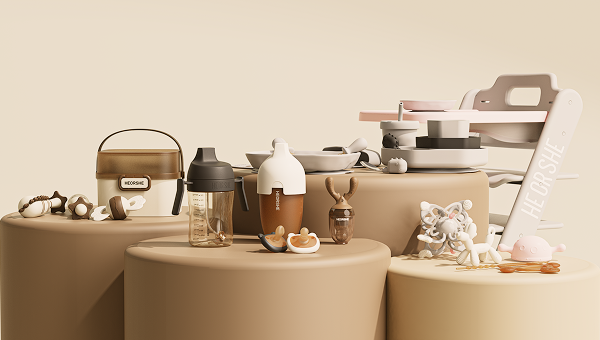As a new parent, one of the most exciting milestones is seeing your baby’s first tooth emerge. However, the process of caring for your baby’s oral health begins long before that first tooth appears. Many parents wonder when to start brushing their baby’s gums or if it’s necessary to use a toothbrush at all when their little one has no teeth. The truth is, oral hygiene starts much earlier than most people realize, and introducing your baby to a newborn toothbrush from the very beginning is essential for ensuring proper oral development.
In this blog, we’ll dive deep into the reasons why your baby needs a toothbrush early on, the benefits of starting oral care before teeth emerge, and how to choose the best oral toothbrush for your baby’s delicate gums. By the end, you’ll have all the information you need to establish good oral hygiene habits for your newborn, setting them on the path to a lifetime of healthy smiles.
Why Start Oral Care Early?
Many parents believe that oral care is only necessary once teeth appear, but that couldn’t be further from the truth. In fact, oral care should start even before your baby’s first tooth erupts. Here are the key reasons why:
1. Preventing Bacteria Build-Up
Even though your baby may not have teeth yet, their mouth still contains bacteria. After each feeding, whether it’s breast milk or formula, residue can remain on the gums, creating an environment for bacteria to thrive. This bacteria can lead to gum inflammation or other issues down the line, so gently cleaning your baby’s gums with a newborn toothbrush is an important preventive measure.
2. Early Development of Oral Hygiene Habits
The sooner you start brushing, the more likely it is that your baby will develop good oral hygiene habits that last a lifetime. Introducing a toothbrush to your baby early on helps them become accustomed to the sensation and routine of brushing, which will make it easier for them to transition to brushing their teeth once they appear.
3. Smoothing the Teething Process
Teething can be a painful experience for babies. The pressure of emerging teeth can cause soreness in their gums. Using an ultra-soft toothbrush to gently massage your baby’s gums can offer relief from this discomfort. It’s a simple way to help soothe your baby while also cleaning their gums.
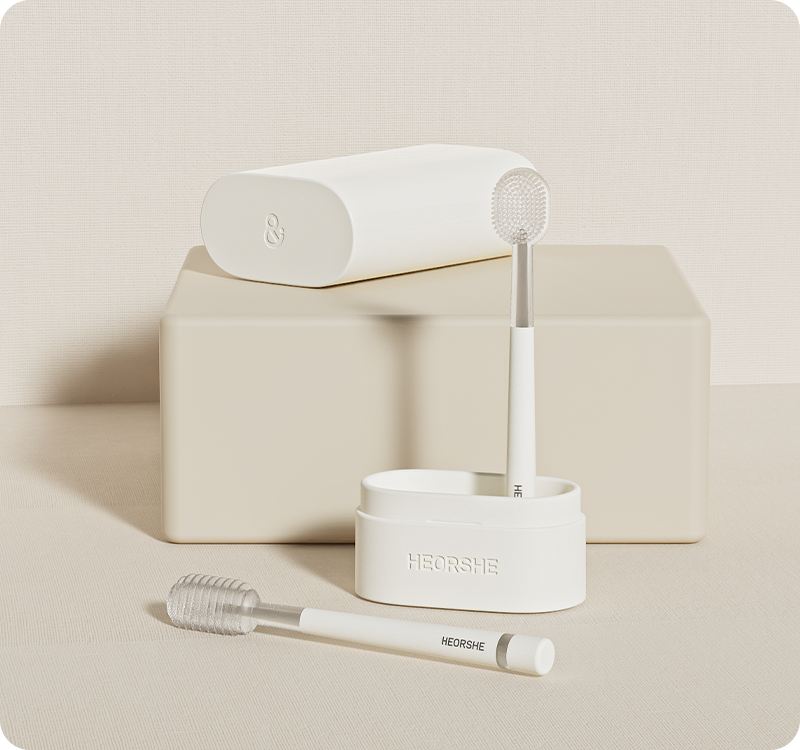
Benefits of Using a Newborn Toothbrush
There are numerous benefits to starting oral care early with a newborn toothbrush, even before your baby’s teeth come in. Let’s explore some of the key advantages:
Prevention of Gum Issues
Just like adult gums, baby gums can be susceptible to infection and irritation. Without regular cleaning, the buildup of milk or formula residue can lead to conditions like gingivitis or gum inflammation. Using a tooth brush with ultra-soft bristles to clean your baby’s gums helps remove this residue and prevent gum-related issues.
Establishing a Healthy Routine
The early introduction of an oral toothbrush helps your baby become familiar with the idea of oral hygiene. Babies thrive on routine, and incorporating brushing into their daily activities creates a healthy habit that will last as they grow older.
Supporting the Eruption of Teeth
By cleaning your baby’s gums regularly, you’re not only preventing bacteria buildup but also helping to prepare the gums for the eventual eruption of teeth. Brushing stimulates the gums, promoting healthy tissue and ensuring that the teeth that eventually come through are in the best condition possible.
What Makes a Good Newborn Toothbrush?
When choosing a toothbrush for your baby, it’s essential to select one that’s specifically designed for their age and needs. Here’s what to look for in a good newborn toothbrush:
1. Ultra-Soft Toothbrush Bristles
Babies’ gums are delicate and can easily be irritated. An ultra-soft toothbrush ensures that you can gently clean your baby’s gums without causing any discomfort. The soft bristles are ideal for sensitive areas, allowing you to massage their gums and remove milk residue without damaging the delicate tissue.
2. Small, Rounded Head
A newborn toothbrush should have a small head to fit comfortably into your baby’s tiny mouth. A rounded head also minimizes the risk of injury to your baby’s mouth and gums during brushing.
3. Non-Slip Handle
Since babies are still developing their fine motor skills, you need a toothbrush with an ergonomic handle that’s easy for you to grip. A non-slip handle will give you better control, especially when you’re brushing your baby’s teeth or gums.
4. BPA-Free Materials
Ensure that the toothbrush is made from safe, non-toxic materials. BPA (Bisphenol A) is a harmful chemical that can be found in some plastics, so always choose a tooth brush made from BPA-free materials to protect your baby’s health.
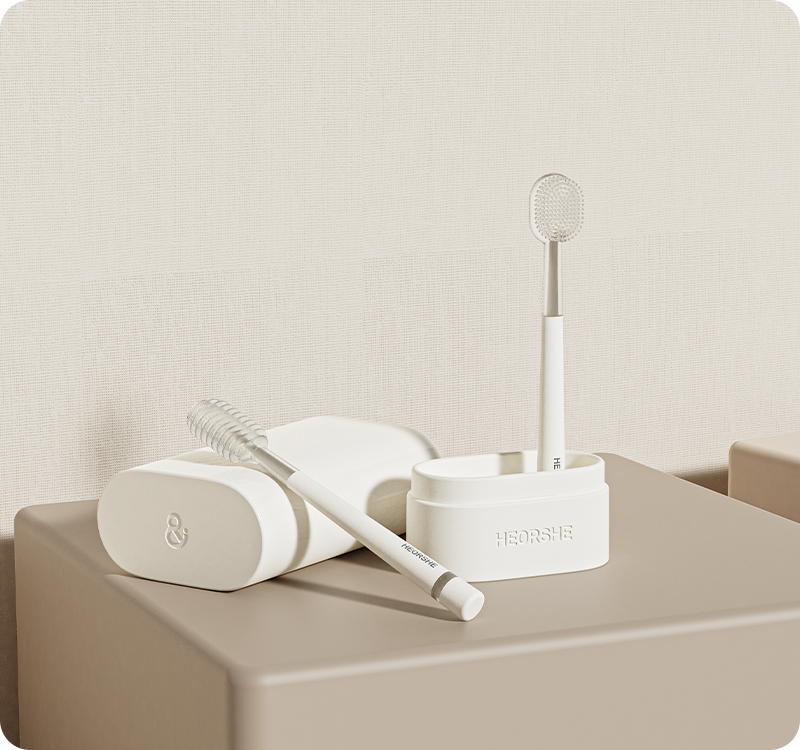
Types of Toothbrushes for Babies
There are different types of toothbrushes designed specifically for newborns and infants. Understanding the various options can help you make the best choice for your baby’s needs:
a. Finger Toothbrushes
A finger toothbrush is a soft silicone brush that fits over your finger. It’s a great option for gently massaging your baby’s gums, especially in the early stages when they don’t yet have teeth. Finger toothbrushes are easy to use and offer a gentle way to clean your baby’s gums and soothe teething discomfort.
b. Traditional Toothbrushes
Traditional toothbrushes for babies look similar to adult toothbrushes but are designed with a smaller head and softer bristles. These are great for when your baby starts to develop their first teeth. Look for a toothbrush with a handle that’s easy for you to hold while brushing.
c. Teething Toothbrushes
Some oral toothbrushes are designed with teething in mind. These brushes have extra-soft bristles and are made from safe materials that babies can chew on. These dual-purpose toothbrushes help massage sore gums while also cleaning your baby’s teeth once they emerge.
How to Use a Newborn Toothbrush
Introducing a tooth brush into your baby’s daily routine doesn’t have to be difficult. Here’s a step-by-step guide to using a toothbrush on your newborn:
Start Early
It’s never too early to begin cleaning your baby’s gums. You can start using a newborn toothbrush as soon as you bring your baby home from the hospital, even before their first tooth erupts.
Use Water Only
For newborns, you don’t need toothpaste right away. Simply use lukewarm water to clean your baby’s gums and gently remove any milk residue. You can also use a soft washcloth to wipe your baby’s gums.
Be Gentle
When brushing your baby’s gums, apply very light pressure. The goal is to massage the gums and clean away any residue, not to scrub or irritate the gums.
Establish a Routine
Consistency is key when it comes to oral care. Try to clean your baby’s gums at least once a day, ideally after their last feed of the day. This will help your baby get used to the routine and associate it with comfort.
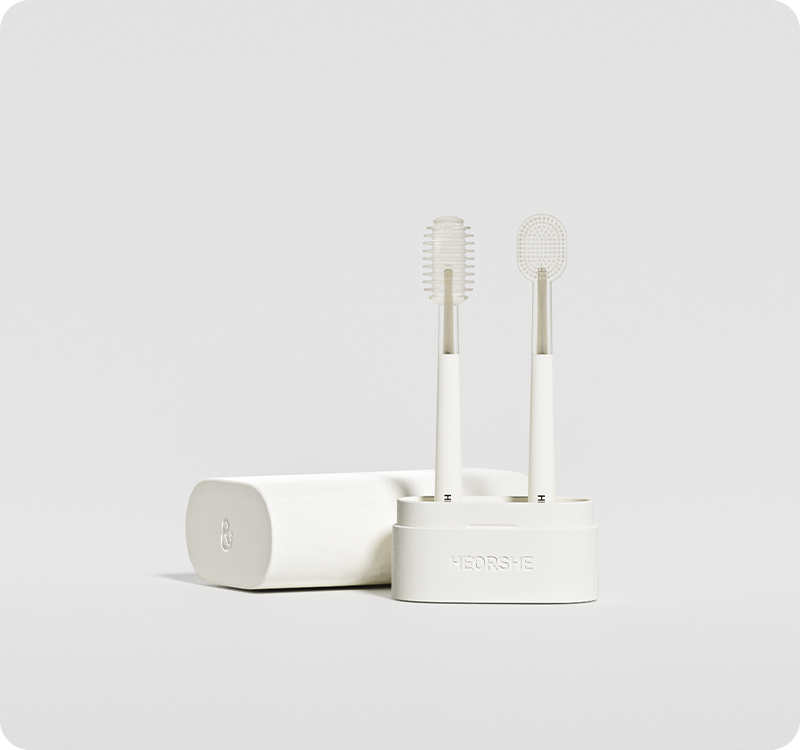
Addressing Common Concerns
As you begin incorporating oral care into your baby’s routine, you may have some questions or concerns. Let’s address a few common ones:
a. “Isn’t My Baby Too Young for a Toothbrush?”
No, your baby is never too young for a toothbrush! In fact, it’s better to start early, even before the first tooth appears. Gently cleaning your baby’s gums helps prevent bacteria buildup and introduces them to the concept of oral hygiene.
b. “What if My Baby Resists?”
It’s normal for babies to be fussy when you first introduce a toothbrush. Try making it fun by singing songs, showing them the toothbrush, or letting them hold it themselves. With patience and consistency, they’ll eventually accept it as part of their routine.
c. “When Should I Start Using Toothpaste?”
You can start using toothpaste once your baby’s first tooth emerges. Use a small, pea-sized amount of fluoride-free toothpaste, and make sure it’s safe for babies.
Maintaining Your Baby’s Toothbrush
It’s important to keep your baby’s toothbrush clean to ensure proper oral hygiene. Here’s how:
- Rinse Thoroughly: After each use, rinse the toothbrush under warm water to remove any residue.
- Replace Regularly: You should replace your baby’s toothbrush every 2-3 months or sooner if the bristles start to fray.
- Proper Storage: Store the toothbrush upright in a dry place, such as a toothbrush holder, to keep it clean and free from bacteria.
Transitioning to Brushing Teeth
Once your baby’s first tooth appears, it’s time to start brushing with a tooth brush designed for infants. Here’s how to make the transition:
a. Add Toothpaste
Once teeth emerge, use a small amount of fluoride toothpaste to brush your baby’s teeth. Make sure to use a toothpaste that is specifically formulated for babies.
b. Brush Twice Daily
Start brushing your baby’s teeth twice a day, once in the morning and once before bed, to remove plaque and bacteria.
c. Encourage Independence
As your baby grows, encourage them to hold their own toothbrush. Supervise them to make sure they’re brushing correctly.
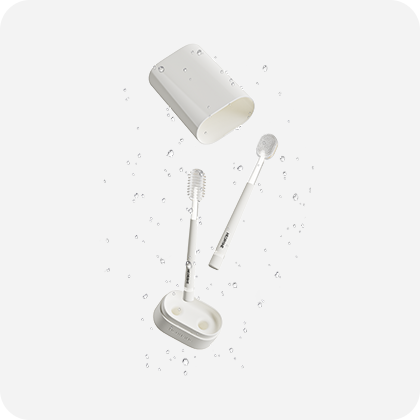
Long-Term Benefits of Early Oral Care
Starting oral care early with a newborn toothbrush offers numerous long-term benefits:
- Healthier Teeth: Regular brushing prevents cavities and gum issues, leading to healthier teeth as your child grows.
- Better Habits: The earlier you start, the more likely it is that your child will develop a lifelong habit of brushing.
- Fewer Dental Visits: Early care reduces the risk of dental problems, leading to fewer visits to the dentist.
Conclusion
Starting early with a newborn toothbrush is one of the best ways to ensure your baby’s oral health from the very beginning. Not only does it help prevent bacteria buildup and soothe sore gums, but it also sets the stage for healthy oral habits that will last a lifetime. By choosing the right ultra-soft toothbrush and establishing a daily routine, you’re giving your baby the gift of healthy teeth and gums for years to come.

